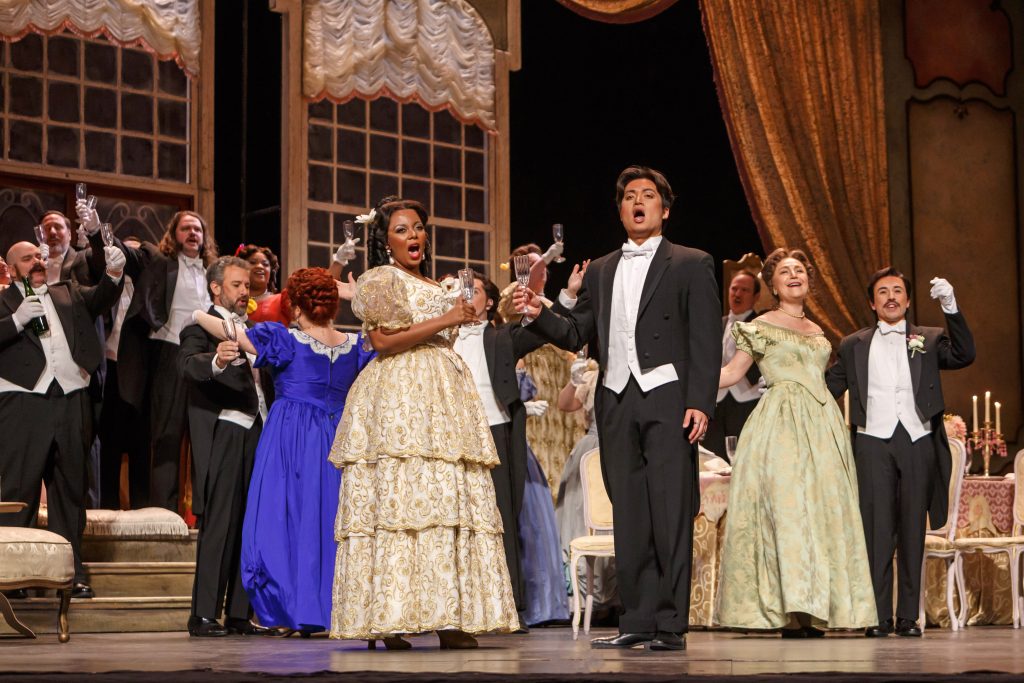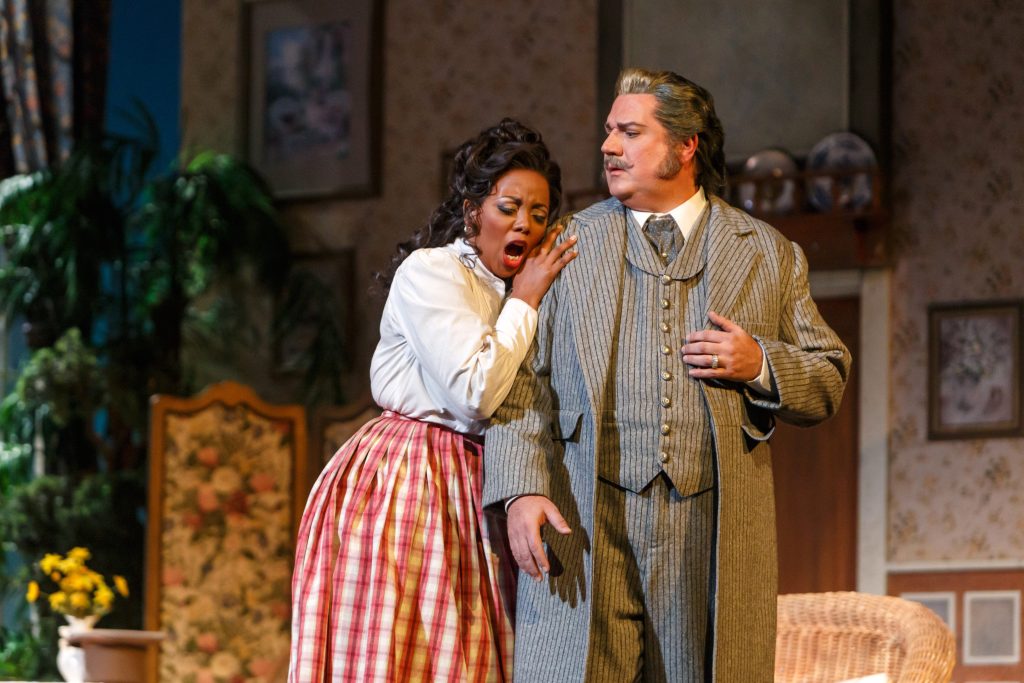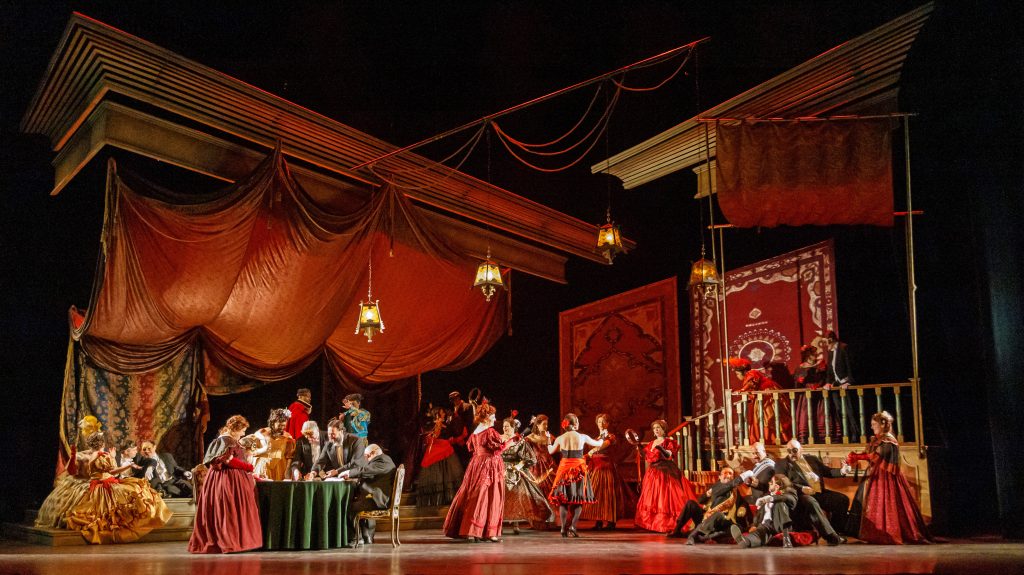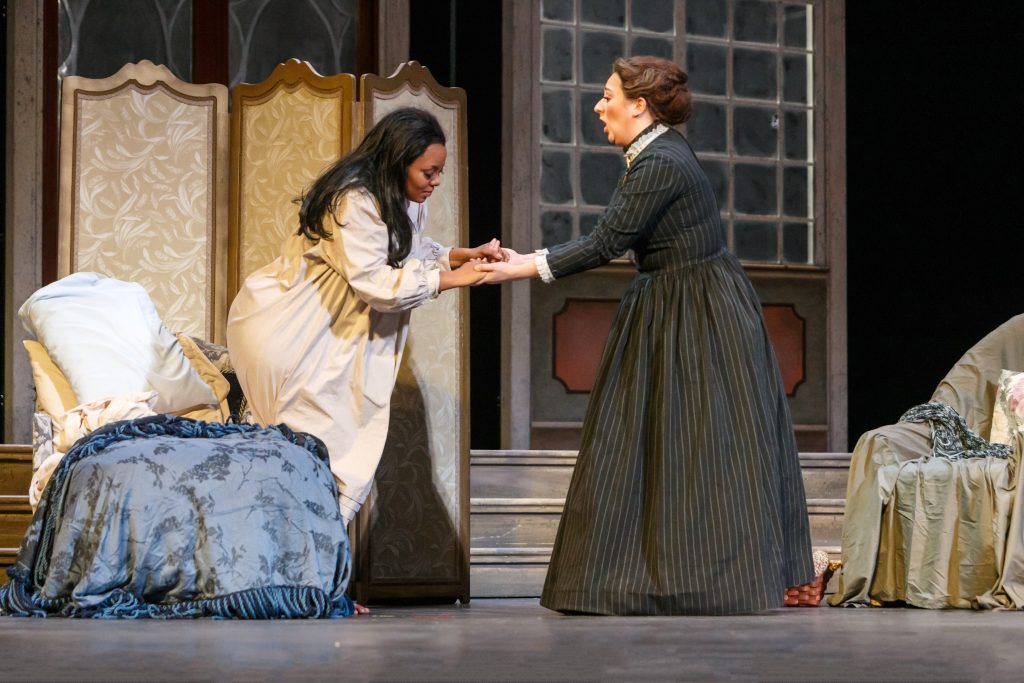‘La Traviata’: In All The World, Pittsburgh Opera Brings It Home

Violetta Valéry (Vuvu Mpofu) welcomes Alfredo Germont (Duke Kim) to join her in the drinking song ‘Libiamo ne’lieti calici,’ one of the more memorable choral elements of Verdi’s tragic opera.
Verdi’s most famous opera, La Traviata, is today, according to Operabase.com, the most produced opera around the world with more than 4,000 performances logged annually. In fact, a spot check on the same website for Saturday, March 16, 2024 cited 5 performances of this one opera on stages in Sydney, Australia; Hamburg, Germany; Tampere, Finland; Kaunas, Lithuania; and Pittsburgh, USA. La Traviata is a favorite of opera fans for many reasons. Other than for Verdi’s lauded score (of course,) some adore its sheer breadth of emotion, others its simplicity of plot, and still others, its forgiving demand on talent. (Apocryphal as the latter may seem, the opera requires only three accomplished voices truly to carry the show.) Worry not that the Pittsburgh Opera’s current production of La Traviata at the Benedum Center suffers any dearth of plentiful and magnificent talent nor does it lack anything in stage design, costuming or the casting here of more than 40 “guests” attending the several extravagant festivities of mid-18th century Paris. This is a huge production, triumphant in talent, and exemplary in direction, design and theatrical integrity.
Sordid Escapades
When a young man of high society is formally introduced to a vivacious courtesan (think high-priced female escort), he falls instantly in love. Alfredo Germont, and his entertaining lady, Violetta Valéry, retreat to his country estate where, without formal commitment, they live in comfortable bliss. When Alfredo’s father, Giorgio Germont, meets Violetta, everything comes to a halt. His son’s passions are sure to tarnish his family’s good name. Yet, so generous and so gracious is Miss Valéry that when Father Germont instructs her to break up their scandalous tryst, she does so only at peril of breaking Alfredo’s heart. She returns to Paris and sheepishly carries on with a former lover, Baron Douphol. Meanwhile Alfredo, crushed by Violetta’s mysterious and sudden departure, seeks understanding. He confronts the Baron at a wild party, wins a small fortune from him at the gaming table, and is challenged to a duel. When Violetta arrives late, the now humiliated Alfredo throws his winnings at her and stomps off. Months later, Miss Valery is discovered living with consumption (think tuberculosis) in near poverty when Alfredo, learning of her undeserved circumstance, returns to save her. Spoiler alert: she nearly survives.
True and Tragic
The story follows that of a true affair conducted by the famous Alexandre Dumas fils (son of the man who wrote The Count of Monte Cristo and The Three Musketeers) who fell in love with the professional courtesan Marie Duplessis (then just 22 years of age,) and later modeled his brief affair in La Dame aux Camélias. Rewritten as a play it became the basis of dozens of memorable storylines including the musical Moulin Rouge and even the film Pretty Woman (wherein, with cinematic similitude, Richard Gere flies Julia Roberts to San Francisco to attend a production of La Traviata.) Not surprisingly, hedonism and hypocrisy often serve as dramatic issues when a rich man and a poor prostitute fall in love. Perhaps, that’s the secret sauce Verdi found delicious in writing his most famous work.

Despite his demands, Violetta resigns herself to Giorgio Germont’s (Michael Chioldi) fears that his son and family will be ruined by her advances.
Pittsburgh Opera’s current production exceeds expectations in several curious but memorable ways. Here, La Traviata opens, not with the flourish of a grand Parisian ball where the guests laugh and drink with indifference to the starving workaday world outside, but rather to a simple estate auction. Someone has died and the few items going up for bid are paltry and small. The dimly lit scene ends and is followed by plentiful guests brightly drinking and dancing as we had first expected. Stage Director Kristine McIntyre has claimed her stake with this production, revealing briefly the remorse and grief that Dumas fils himself may have projected in his inspiring novel. (Unlike the fictional Alfredo, Dumas fils, was not present at Marie Duplessis’ death.) The scene adds a welcome, if unusual, perspective to McIntyre’s exceptional production.
Worldly Talent
One of South Africa’s most celebrated divas of recent years, Vuvu Mpofu makes her Pittsburgh Opera debut as Violetta Valery. Her mastery of the role is evident and, in fact, La Traviata was the first opera she ever saw, albeit on a DVD, when she was in high school in her hometown of Port Elizabeth, Cape Town. Verdi’s classic opera was her introduction to a world she never knew existed, a world which, by this performance, exclaims she owns. If projection, enunciation and stage presence are nearly as important as vocal range and melodic interpretation, Mpofu commands them all.
As Alfredo Germont, Duke Kim, too, makes his Pittsburgh Opera debut. A 2015 graduate of Chapman University, Kim performs as a young Alfredo, earnest in his love for Violetta. Kim is both charming and energetic, adding to his strong tenor voice resolute passion. Accomplished in every manner of operatic voice, Kim’s projection was only upstaged by his more forceful co-stars. As Papa Germont, Michael Chioldi, also debuting with the Pittsburgh Opera, offers up his deep experience in the role with deserving pride. Chioldi’s colorful baritone ruled the stage. Appearing far older than his actual age, his fatherly role is bold and necessarily bombastic.
Dramatic Design

Masking more than their hedonistic tendencies, guests game the system for quick cash and intolerant behavior.
Classic opera need not be staged with breathtaking scenery, coordinated costumes, or oversized choruses to “bring home the goods,” but here the Pittsburgh Opera has delivered a rich and particularly thoughtful production only a full complement of designers, technicians, stage hands and behind-the-scenes artisans could deliver. Set designer Peter Dean Beck has erected an awe-inspiring grand ballroom, country estate, salon and Parisian apartment with far more flexibility than that which his decorative detail should allow. Yet every new scene is a welcome observation of opportunity. Glenn Avery Breed’s costuming is resplendent, well conceived and compelling. Bawdy Parisian partiers are as well attended to as the high and mighty dancing in grander ballrooms. Young Alfredo is particularly well dressed and, fittingly, his father is stodgily so; an apt contrast. And perhaps all too rare to experience, unless one attends the Met or La Scala, the evening’s large chorus is a wonderful assembly of players and voices that ring true to scale and conformity. If the audience could not have appreciated the intricacy of artistic collaboration in this grand production, Director McIntyre allows it to shine. In an unusual turn of direction, McIntyre raises the curtain at the end of act two so the audience can appreciate a visual tableau frozen from the scene just moments before.
Above and Beyond
Credit is due many of the supporting cast. Brendon Bell as Baron Douphol, Oren Gradus as Doctor Grenvil, or Julia Swan Laird as Violetta’s maid Annina. They all deserve more appreciation than space here will allow, but consider their contributions as truly special. Likewise, conductor Antony Walker and his orchestra of nearly 50 musicians deserve more than the thunderous accolades they received at curtain call. Further attention should be afforded lighting designer Marcus Dillard, wig and make-up designer James Geier, and, at the least, stage manager Cindy Knight, but so many more artists and technical staffers, credited and uncredited, should be thanked, as well.

Annina (Julia Swan Laird), ever attendant to her mistress, Violetta Valéry, struggles to get her up from her sick bed.
Last staged here eight years ago, Pittsburgh Opera’s La Traviata, playing now only through March 24, is a full, yet fluid evening of powerful opera. If you have never attended a performance before, consider Verdi’s most popular contribution—as well as this particular production—your best choice. After all, unless you prefer flying to Milan, Prague, Dublin or Seoul on any other night, Pittsburgh’s Benedum Center offers a very convenient stage.
Photos: David Bachman Photography for Pittsburgh Opera.
C. Prentiss Orr is a Pittsburgh-based writer who covers theater and other topics for Entertainment Central. He is the author of the books The Surveyor and the Silversmith and Pittsburgh Born, Pittsburgh Bred.
Share on Social Media
Follow Entertainment Central
Latest Stories
Sign up for the EC Newsletter







